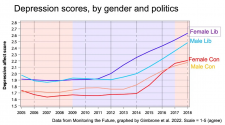When asked whether she felt safe, Smart Holding CEO Julia Kiryanova — head of one of Ukraine’s largest investment conglomerates — paused and then said firmly, “Nobody’s safe.”
For months now, Kiryanova has been battling to save Smart Holding from what appears to be a corporate raid — one she believes involves senior Ukrainian government officials and is aimed at forcing the company to agree to a fire sale. There’s peril in resisting “because when the law is not there, any person can be persecuted for no reason,” she said.
Kiryanova believes Russia’s war on Ukraine is being used by powerful and politically connected players in Ukraine to enrich themselves by extorting, plundering and weakening commercial rivals — as well as an opportunity to redistribute corporate assets, partly in a bid to strip the old elite of wealth in order to shape a new one. And it’s all being done with scant regard to the rule of law.
“New oligarchs will appear soon,” she said.
Kiryanova and other corporate executives say the “reordering” has seen some firms — including Smart Holding — face dubious criminal charges, or be added to Ukraine’s list of sanctioned companies by the Security Service of Ukraine (SBU) on highly vague national security grounds.
Parimatch — a leading global sports betting company — has recently been added to this list of sanctioned businesses, but it has yet to receive any formal explanation as to why. Informally, executives have been told Russian links to firms providing administrative services to the company were found. Other times, they’ve been told they’ve been sanctioned due to tax irregularities, even though tax infringements aren’t grounds for inclusion on the sanctions list.
But these moves against Ukraine’s most successful companies are raising eyebrows — not just in Kyiv — and risk deterring foreign investors, adding to behind-the-scenes worry regarding the country’s seemingly endemic and intractable corruption problem, which has dogged it for decades. Last year, some European Union countries, including Germany, even delayed the distribution of financial aid to Ukraine due to accountability concerns that money could be diverted into corrupt schemes.
Today, Smart Holding is one of Ukraine’s largest investment groups, focused on metals, mining, oil, gas, agriculture, retail, shipbuilding and real estate. It also has a 23 percent stake in Metinvest, another major mining and metals group, which is the owner of the Azovstal Iron and Steel Works in Mariupol. The steelworks was destroyed during the long siege of the city.
According to Kiryanova, Smart Holding stopped trading in Russia after 2014.
Meanwhile, Maxym Liashko, the co-CEO of Parimatch, is equally perplexed as to why his business has been targeted. Founded in 1994 in Kyiv and now headquartered in Cyprus, the company operates under licenses issued by local regulators in Ukraine, Central Asia, Africa, the Indian subcontinent, the United Kingdom — and, until recently, in Russia and Belarus, but it immediately withdrew from those markets when Ukraine was invaded, ending franchise agreements and losing millions of dollars.
Picking up on rumors in government circles that the betting market in Ukraine would be purged of any Russian links, Parimatch bombarded authorities with letters and emails emphasizing its Ukrainian ownership and highlighting it was no longer present in the Russian market, even commissioning a report from a major American law firm, which has been read by POLITICO, to attest to that fact. Parimatch has so far donated over $40 million to war-related humanitarian causes.
Nonetheless, in March, it was sanctioned. “There was no formal communication, no explanation, and other government agencies say they can’t help because it is in the hands of the SBU and they have no competency in the matter,” an exasperated Liashko said. “Some officials refer to an SBU letter” explaining the reasons for the sanction, but “they won’t share it with us because it’s secret. That’s transparency,” he added.
POLITICO asked the SBU to comment on both cases but has received no response.
Ironically, the suspension of Parimatch’s operating license and the freezing of its assets — including winnings owed to successful gamblers — has benefitted rival Russian operators, according to Mikhailo Makaruk of InformNapalm, a volunteer investigative initiative. “The squeezing of Parimatch is destroying the legal betting market, pushing gambling underground. And Ukrainians are still betting online, but it is Russian companies that are gaining,” he said.
Makaruk worries an internal commercial war is being waged in Ukraine, affecting everything from agri-business to the country’s well-respected IT sector — and he’s not alone. As one corporate executive told POLITICO: “When the country and people need unity the most, some of the very powerful are using the cloud of war to rape businesses.”
Speaking on condition of anonymity due to fear of retaliation, the executive added: “No previous administration has accumulated so much power — basically unlimited power — and because of the war, it is untouchable in the eyes of the international community and the media.”
“Speaking out publicly is difficult because I don’t want to say anything that might endanger the war effort, but sanctioning successful companies shouldn’t be done to clear out competitors or punish somebody you don’t like,” he said.


